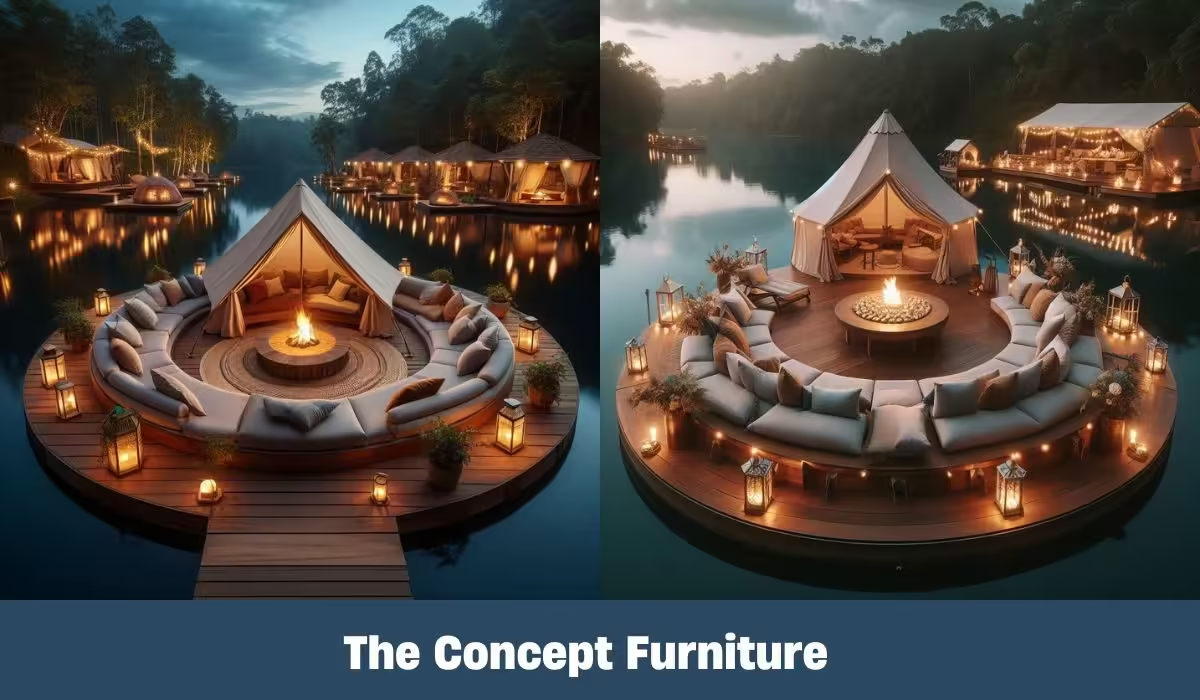Floating campsites offer a unique and immersive way to experience nature, combining camping with the tranquility of being on the water. For those who seek adventure beyond traditional land-based camping, floating campsites present an exciting alternative that allows individuals and families to reconnect with nature while enjoying a variety of water-based activities. In this article, we will delve into the concept of floating campsites, exploring their history, benefits, types, essential gear, planning tips, activities, cooking methods, safety precautions, sustainable practices, and popular destinations. Whether you are a seasoned camper or a novice adventurer, floating campsites can provide an unforgettable experience in the great outdoors.
Introduction to Floating Campsites
The allure of floating campsites lies in their ability to blend the serenity of water with the joys of camping. Imagine waking up to the gentle lapping of waves against your shelter, surrounded by the enchanting sights and sounds of nature. Unlike traditional campsites, which can sometimes feel crowded and disconnected from the natural environment, floating campsites provide a sense of privacy and seclusion. This section will explore the concept of floating campsites, tracing its historical roots and discussing how it has evolved over time.
Understanding the Concept of Floating Campsites
Floating campsites are essentially makeshift camping locations situated on bodies of water such as lakes, rivers, or coastal areas. These innovative sites can take various forms, including houseboats, rafts, floating tents, and platforms. The primary objective is to create a space where campers can enjoy the beauty of aquatic environments while engaging in recreational activities like fishing, swimming, and kayaking.
The experience of floating camping transcends traditional outdoor living; it offers a unique perspective on nature. Campers often find themselves more attuned to their surroundings as they listen to the sounds of birds, the rustle of leaves, and the soft splashes of water, creating a relaxing oasis far from the hustle and bustle of everyday life.
Moreover, the connection between camping and water fosters a deeper appreciation for ecosystems, encouraging individuals to become stewards of the environments they inhabit. This holistic approach to Floating Campsites is not just about enjoying the outdoors; it’s about understanding and respecting the intricate web of life that exists within aquatic ecosystems.
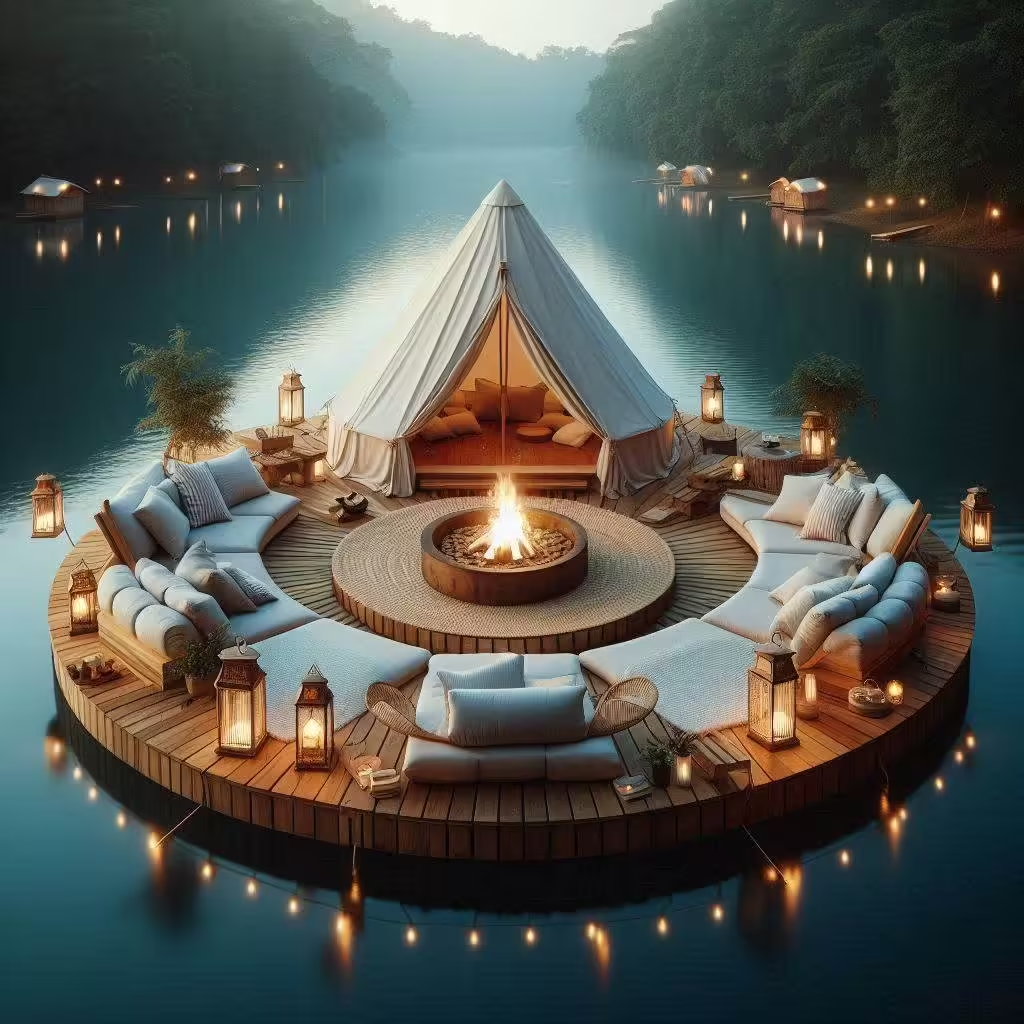
Historical Background of Floating Camping
The concept of floating campsites isn’t entirely new but rather an evolution of centuries-old practices. Historically, various cultures around the world have utilized boats and rafts for both transportation and habitation. The indigenous peoples of North America, for instance, relied on canoes not only for travel but also for seasonal living along riverbanks and coastlines, effectively utilizing the resources available through their intimate relationship with waterways.
In more recent times, particularly during the 20th century, the rise of recreational boating and the popularity of summer vacations by the water led to the development of houseboats and other floating accommodations. As people began to seek more diverse ways to experience nature, floating campsites emerged as a creative solution, allowing individuals to escape the limitations of traditional camping.
Today, with advancements in technology and increased interest in eco-tourism, floating camping has gained popularity among outdoor enthusiasts. From glamping experiences aboard luxurious houseboats to minimalist setups using inflatable kayaks, floating campsites continue to attract adventurous spirits eager to explore the world’s waterways.
Benefits of Floating Campsites
Embracing the experience of floating campsites offers numerous advantages compared to conventional land-based camping. In this section, we will discuss the unique aspects that make floating campsites an appealing option for outdoor lovers.
Unique Experience and Connection with Nature
One of the most significant benefits of floating campsites is the unparalleled experience they provide. Being surrounded by water creates an atmosphere of tranquility and relaxation that is hard to replicate elsewhere. There’s something magical about drifting off to sleep with the rhythmic sounds of water and waking up to breathtaking sunrises reflecting off the surface.
This unique experience fosters a profound connection with nature. Campers often find themselves more immersed in their surroundings, with opportunities to observe wildlife such as fish, birds, and even otters interacting with the water. Floating campsites encourage mindfulness, as the gentle movement of the water invites reflection and introspection.
Additionally, the isolation offered by floating campsites means fewer distractions from modern life, allowing individuals to focus on what truly matters: the beauty of nature, quality time with loved ones, and personal exploration. The simplicity of floating camping can lead to moments of deep appreciation for the natural world and one’s place within it.
Opportunities for Water-Based Activities
Another advantage of floating campsites is the abundance of activities that can be enjoyed right from your “home base.” The proximity to water opens up a myriad of recreational possibilities that may not be available at traditional campsites.
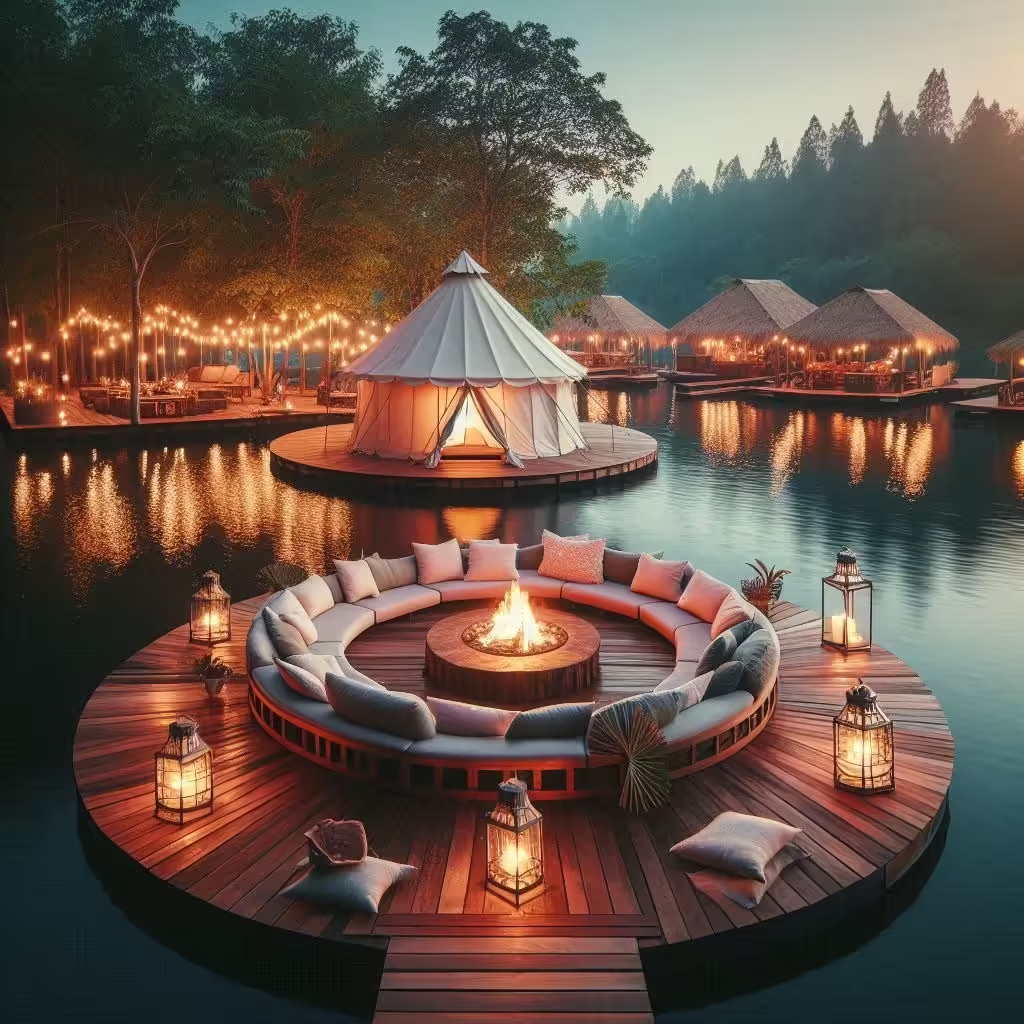
Fishing, for example, becomes incredibly accessible when stationed on a lake or river. Many campers will relish the chance to cast a line directly from their floating campsite, providing a relaxing pastime that often results in fresh catches for dinner.
Moreover, activities like swimming, kayaking, paddleboarding, and snorkeling can easily become part of your daily routine Floating Campsites. The integration of these water-based adventures encourages participants to stay active, engage with their environment, and develop skills related to each activity. Floating camping enables a balanced lifestyle where relaxation and recreation coexist harmoniously.
Escape from Crowded Traditional Campsites
For some, the idea of camping in a crowded campground filled with noise and distractions can be less than appealing. Floating campsites offer a refreshing escape from the hustle and bustle associated with popular camping destinations.
By selecting remote or lesser-known bodies of water, campers can find solitude and privacy that may be challenging to achieve on land. The ability to anchor in secluded coves or drift to uninhabited islands allows for a true sense of adventure and freedom.
This drastic change in scenery can rejuvenate the spirit, away from the clamor of fellow campers and the constraints of established campgrounds. Floating campsites provide an opportunity to foster deeper connections with companions while offering an idyllic backdrop for storytelling, bonding, and relaxation.
Types of Floating Campsites
Floating campsites come in various forms, each with its own set of features and advantages. In this section, we’ll explore different types of floating campsites, examining how each one caters to unique preferences and camping styles.
Houseboats as Floating Campsites
Houseboats represent one of the most comfortable and spacious options for floating camping. These vessels range from basic models designed for short trips to luxurious accommodations complete with kitchens, bathrooms, and multiple sleeping quarters Floating Campsites. Houseboat rentals can be found in many scenic regions, making them an ideal choice for families or groups looking for a more leisurely experience on the water.
Staying aboard a houseboat allows campers to enjoy all the comforts of home while still being enveloped by nature. Many houseboats come equipped with outdoor decks for lounging, fishing, or simply appreciating the view, creating a seamless transition between indoor and outdoor living.
Moreover, houseboats can serve as a wonderful platform for entertainment, whether hosting a barbecue, playing board games, or simply enjoying evening stargazing with friends Floating Campsites. The versatility of houseboats makes them a practical choice for those seeking both adventure and comfort on their floating camping journey.
Rafting and Canoeing Campsites
For those looking for a more hands-on experience, rafting and canoeing campsites provide an exhilarating and interactive way to embrace floating camping. These setups typically involve a portable raft or canoe that serves as both transportation and a temporary living space while camping.
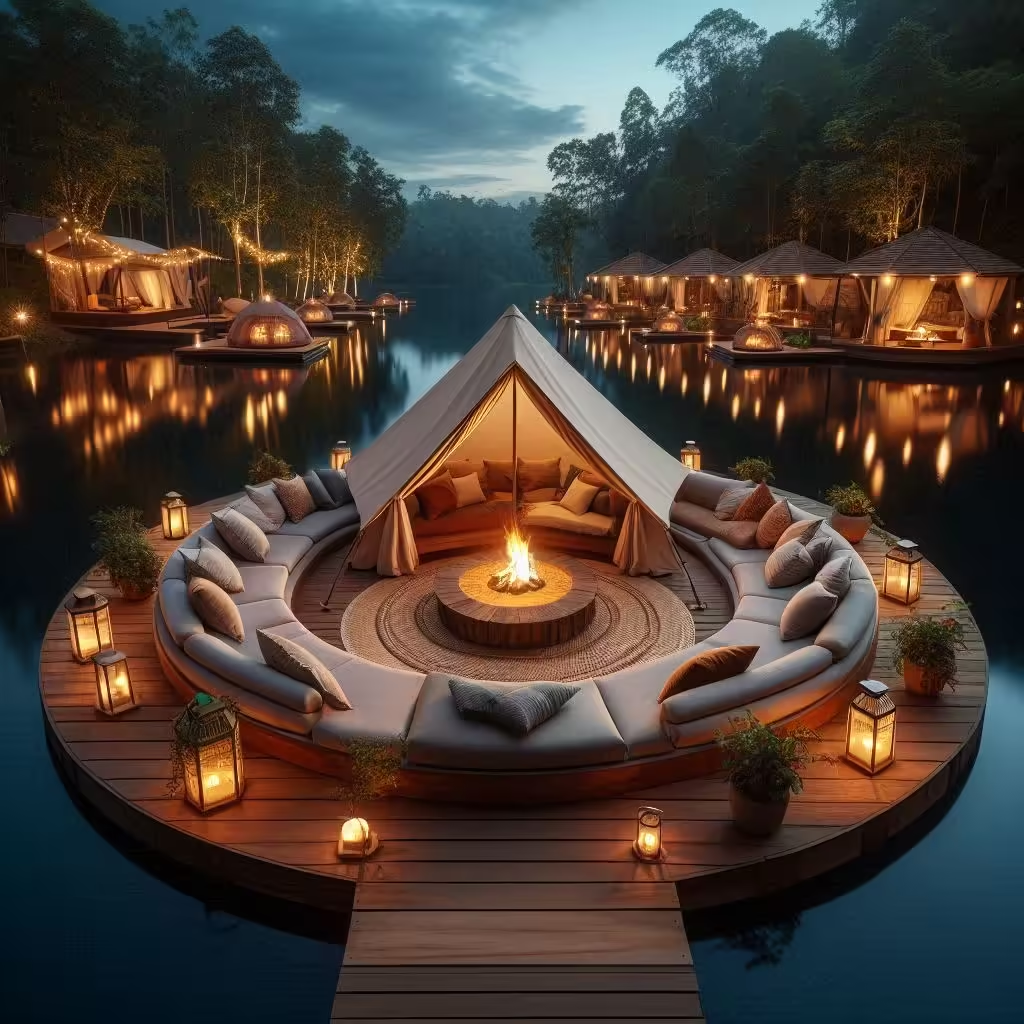
Adventurers can embark on a guided rafting trip or plan their own journey down rivers known for their scenic beauty and varying levels of difficulty Floating Campsites. With the ability to pull off to shore and set up camp wherever desired, this style of camping offers flexibility and spontaneity.
Rafting and canoeing campsites promote a strong connection with nature, as campers must navigate currents, weather conditions, and potential wildlife encounters. The essence of teamwork is necessary here, encouraging camaraderie among participants as they work together to conquer challenges and appreciate their surroundings.
Floating Tents and Platforms
Floating tents or platforms represent a minimalist approach to floating camping. These setups can range from inflatable platforms or rafts with attached tents to simple structures anchored securely on calm waters. The essence of this style is to immerse oneself fully in the outdoor experience, allowing nature to take center stage.
Using a floating tent or platform allows campers to enjoy the sensations of water beneath them while still having a sheltered space to sleep. It’s essential to choose stable and buoyant options, ensuring safety and comfort throughout the night.
Furthermore, setting up Floating Campsites tents offers a chance to showcase creativity and resourcefulness. Campers can experiment with different designs while considering factors like weight distribution, anchoring techniques, and personal preferences. This type of floating camping nurtures a spirit of innovation and adaptability, enhancing the overall experience.
Essential Gear for Floating Camping
To successfully embark on a floating camping adventure, it is crucial to have the right gear. In this section, we will discuss essential items necessary for a safe and enjoyable floating camping experience.
Choosing the Right Floating Shelter
Selecting the appropriate floating shelter is paramount for your comfort and safety. Depending on your chosen type of floating campsite, options can include houseboats, inflatable tents, or specialized floating platforms.
When considering a shelter, prioritize stability, buoyancy, and waterproof materials. For instance, if you opt for a floating tent, ensure it is designed for water use and can withstand wind and rain.
In addition, think about the size and layout of your shelter. It should accommodate the number of occupants and provide enough space for essential gear Floating Campsites. A well-chosen shelter contributes significantly to a positive floating camping experience, promoting relaxation and security.
Safety Equipment Considerations
Safety should always come first during any outdoor activity, especially when floating on water Floating Campsites. It is crucial to equip yourself with essential safety gear, starting with personal flotation devices (PFDs) for every participant. Wearing a PFD while on the water can save lives, so this should be non-negotiable.
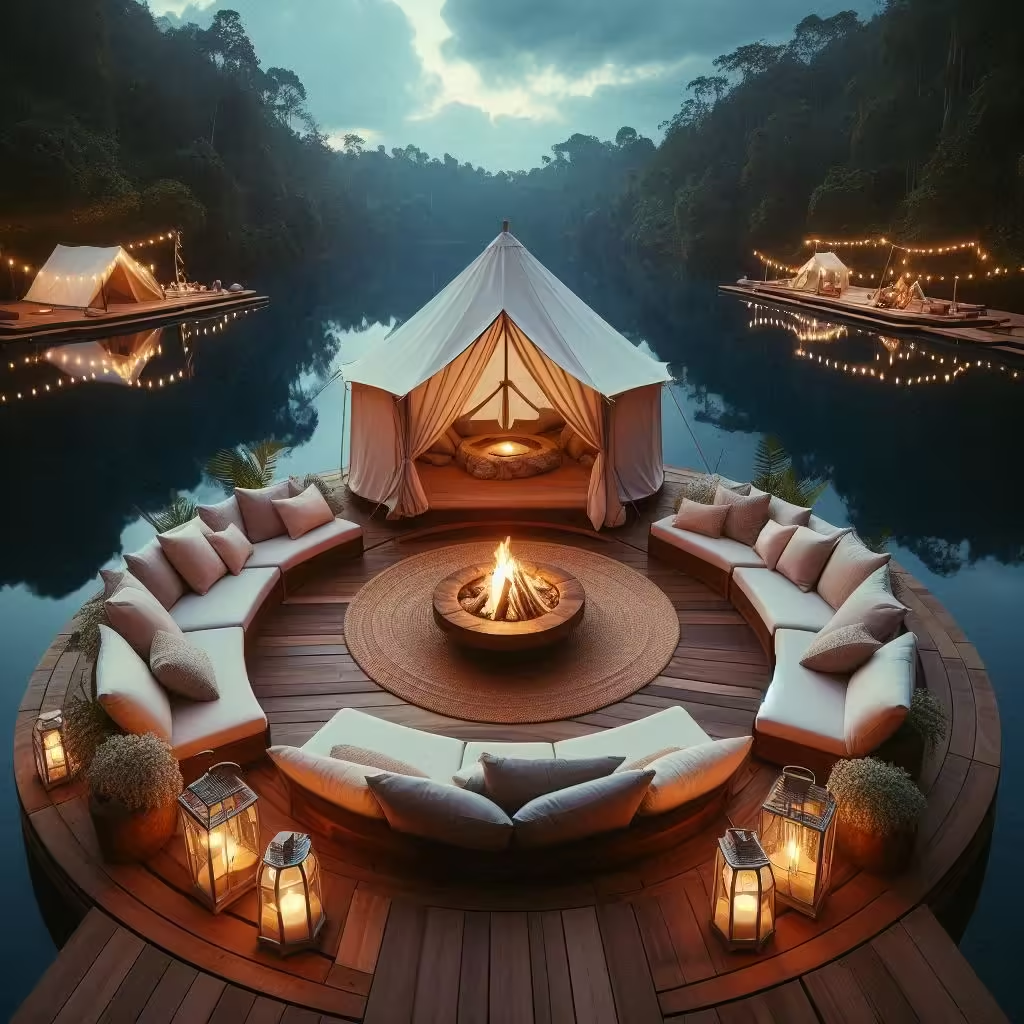
Additionally, consider bringing along a first aid kit, signaling devices, and communication tools such as waterproof radios or satellite phones. Familiarize yourself with emergency procedures relevant to your location in case of sudden weather changes or unforeseen circumstances.
Lastly, investing in a reliable anchor system is vital for securing your floating campsite, ensuring stability during inclement weather or strong winds Floating Campsites. Proper safety equipment ensures that you can fully enjoy your floating camping experience without unnecessary worry.
Packing for Water Adventures
As with any Floating Campsites trip, packing efficiently and thoughtfully is essential for success. When floating camping, it’s vital to consider the unique needs of your environment. Start with clothing that adapts to changing weather conditions, such as moisture-wicking fabrics, quick-drying materials, and layers for warmth.
Food and cooking supplies require particular attention as well. Opt for non-perishable items and easy-to-cook meals that require minimal preparation. Bring portable cooking equipment like camp stoves or grills and utensils for efficient meal preparation.
Remember to pack extra gear for water activities, such as swimsuits, towels, fishing gear, and safety equipment for kayaking or paddleboarding. Effective packing ensures that you’re well-prepared for every aspect of your floating Floating Campsites adventure.
Planning Your Floating Camping Trip
Effective planning is key to a successful floating camping experience. In this section, we’ll focus on important considerations for organizing your trip, from selecting the perfect location to researching local regulations.
Selecting the Perfect Location
Choosing the right location for your floating camping trip can significantly enhance your experience Floating Campsites. Look for bodies of water that are known for their natural beauty, abundant wildlife, and recreational opportunities. Research local lakes, rivers, or coastal areas that align with your interests and availability.
Consider the level of accessibility and amenities in the chosen area. Some locations might offer public access points, while others may require permits for launching or anchoring Floating Campsites. Assess the potential for solitude versus busy tourist spots, depending on your preferences for interaction with other campers.
Additionally, be mindful of the surrounding landscape. Areas with picturesque views, hiking trails, or interesting geological features can elevate your floating camping experience, providing enriching activities beyond your time on the water.
Researching Local Regulations and Permits
Before embarking on your floating camping adventure, it is essential to understand the local regulations governing water usage, camping permits, and environmental protection. Each state or region may have specific laws regarding floating campsites, including restrictions on where you can anchor, camp durations, and waste disposal.
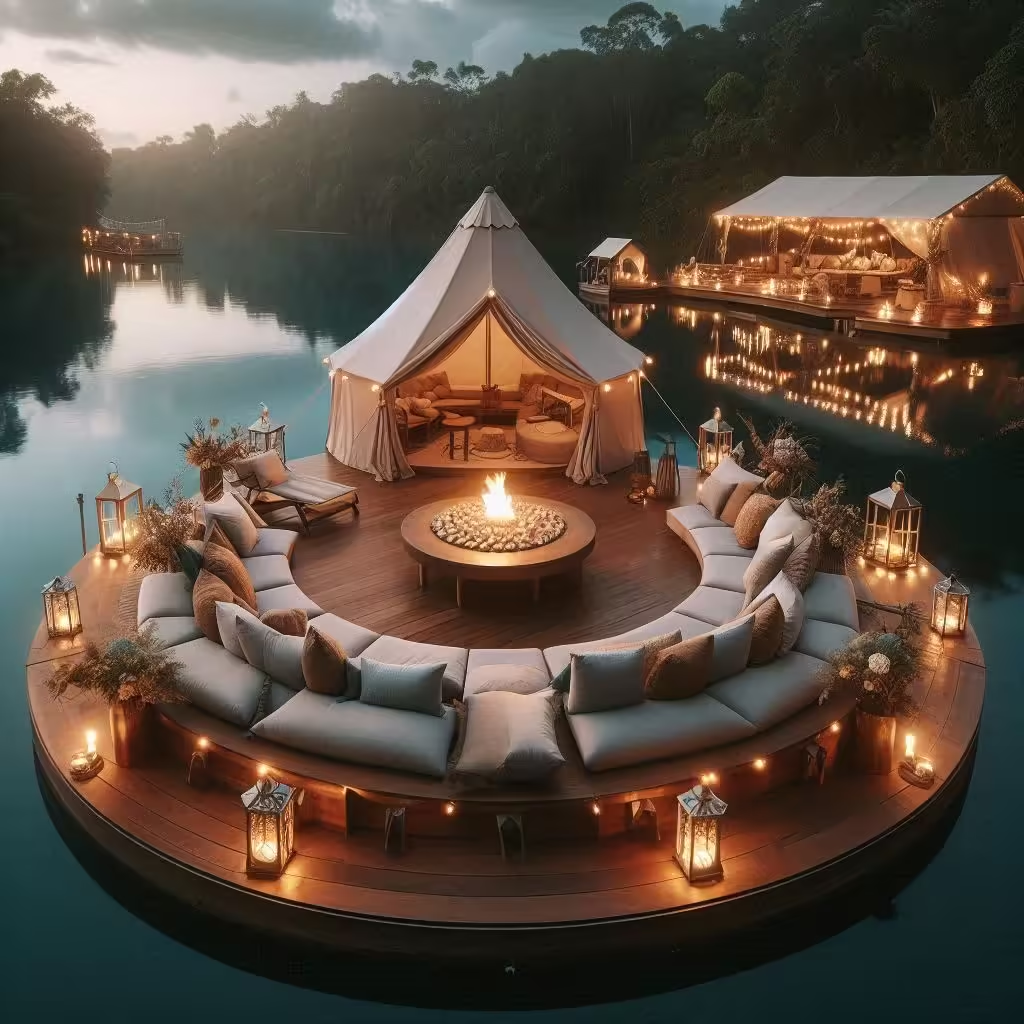
Contact local authorities or visit official websites to gather information on permits needed for your trip. Being aware of regulations helps prevent fines and promotes responsible camping practices.
Furthermore, familiarize yourself with local wildlife regulations to ensure that you do not disturb sensitive habitats or endangered species. Following local guidelines not only protects the environment but also enhances your floating camping experience.
Timing Your Visit for Optimal Conditions
Timing plays a critical role in ensuring a successful floating camping trip. Be mindful of seasonal weather patterns, as water levels and conditions can vary dramatically over time Floating Campsites. Research the best months for camping in your selected area, taking into account factors such as temperature, rainfall, and insect activity.
Seasonal events, such as spawning fish or migratory birds, may enhance your experience but could also result in crowded conditions. Plan your visit during quieter times for a more peaceful escape.
Finally, pay attention to tides and currents if you’re camping in coastal or riverine areas Floating Campsites. Understanding these natural forces will help you choose optimal days for exploration and recreational activities, allowing you to maximize enjoyment during your trip.
Setting Up Camp on Water
Once you’ve arrived at your floating campsite, transforming your floating shelter into a cozy living space requires thoughtful consideration and preparation. This section will explore essential tips for setting up your floating campsite efficiently and comfortably.
Anchoring and Stabilization Tips
Securing your floating campsite is crucial for comfort and safety Floating Campsites. Before you begin setting up, identify a suitable mooring site that offers adequate depth and protection from wind and waves. Look for sheltered areas or coves to minimize exposure to open water and potential disturbances.
Invest in a reliable anchoring system, including heavy-duty anchors or sandbags, to stabilize your floating shelter. Ensure that all anchors are properly secured and tested before settling in. Check the forecast for wind and weather patterns throughout your stay, adjusting your anchoring strategy if necessary.
If you’re using a temporary floating platform or raft, consider tying additional ropes to nearby trees or shoreline for added stability Floating Campsites. This prevents unwanted drifting and ensures a secure setup for your campsite.
Creating a Comfortable Living Space
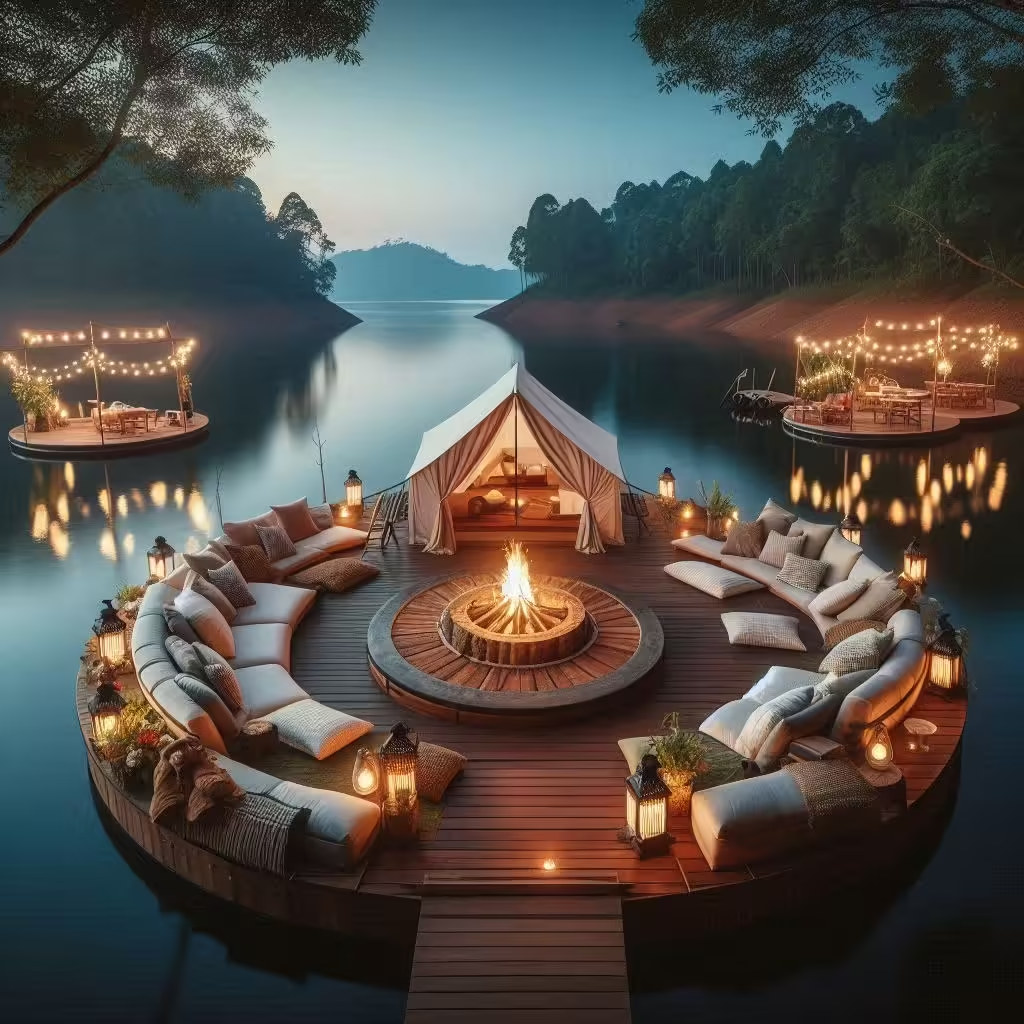
Creating a comfortable living space on the water involves strategic organization and resourcefulness Floating Campsites. Begin by unpacking essential gear and arranging items in a way that maximizes your limited space. Consider using waterproof storage bins to keep gear dry and organized while minimizing clutter.
Bedding and seating arrangements should prioritize comfort. Utilize lightweight sleeping pads or inflatable mattresses for a cozy resting area. If possible, set up outdoor furniture or cushions to create a lounge space for relaxation and socializing.
Lighting is another key factor in creating ambiance Floating Campsites. Battery-operated lanterns or solar-powered lights can illuminate your campsite while conserving energy. Thoughtful enhancements to your living space contribute to an enjoyable atmosphere throughout your floating camping adventure.
Managing Waste and Environmental Considerations
Ensuring that your floating campsite remains clean and environmentally friendly is paramount. Develop a waste management plan before your trip to keep your campsite pristine and protect aquatic ecosystems.
Bring along designated containers for recycling and trash, ensuring that waste is separated and stored until proper disposal can occur Floating Campsites. Rubbish bags should be watertight and sturdy enough to hold all waste produced during your stay.
Be mindful of your impact on flora and fauna during your time on the water Floating Campsites. Avoid disturbing wetlands or nesting areas, and practice Leave No Trace principles to minimize your ecological footprint. By managing waste responsibly and respecting the environment, you’ll leave no trace behind and preserve the beauty of nature for future visitors.
Activities to Enjoy While Floating Camping
Floating camping provides abundant opportunities for adventure and leisure. In this section, we’ll explore various activities that can enhance your experience on the water, ensuring an unforgettable trip.
Fishing and Swimming Opportunities
Fishing is an integral part of the floating camping experience. Many campers find joy in casting their lines directly from their floating shelter, often resulting in fresh catches for meals. Whether you’re an experienced angler or a beginner, fishing from a floating campsite can provide hours of fun and relaxation.
Swimming is another rewarding activity readily available at floating campsites. The refreshing coolness of the water beckons on warm sunny days, offering a much-needed respite from heat. Remember to assess the water’s safety and clarity before diving in, particularly in unfamiliar areas.
Equipping yourself with snorkeling gear allows you to explore underwater ecosystems, observing fish and plants in their natural habitats. Be sure to document your encounters, as sharing your experiences can inspire others to appreciate the wonders of our aquatic environments.
Kayaking and Paddleboarding Adventures
Kayaking and paddleboarding are fantastic ways to explore the surrounding waters while connecting with nature. Rent or bring along your own kayak or stand-up paddleboard to navigate serene lakes or winding rivers.
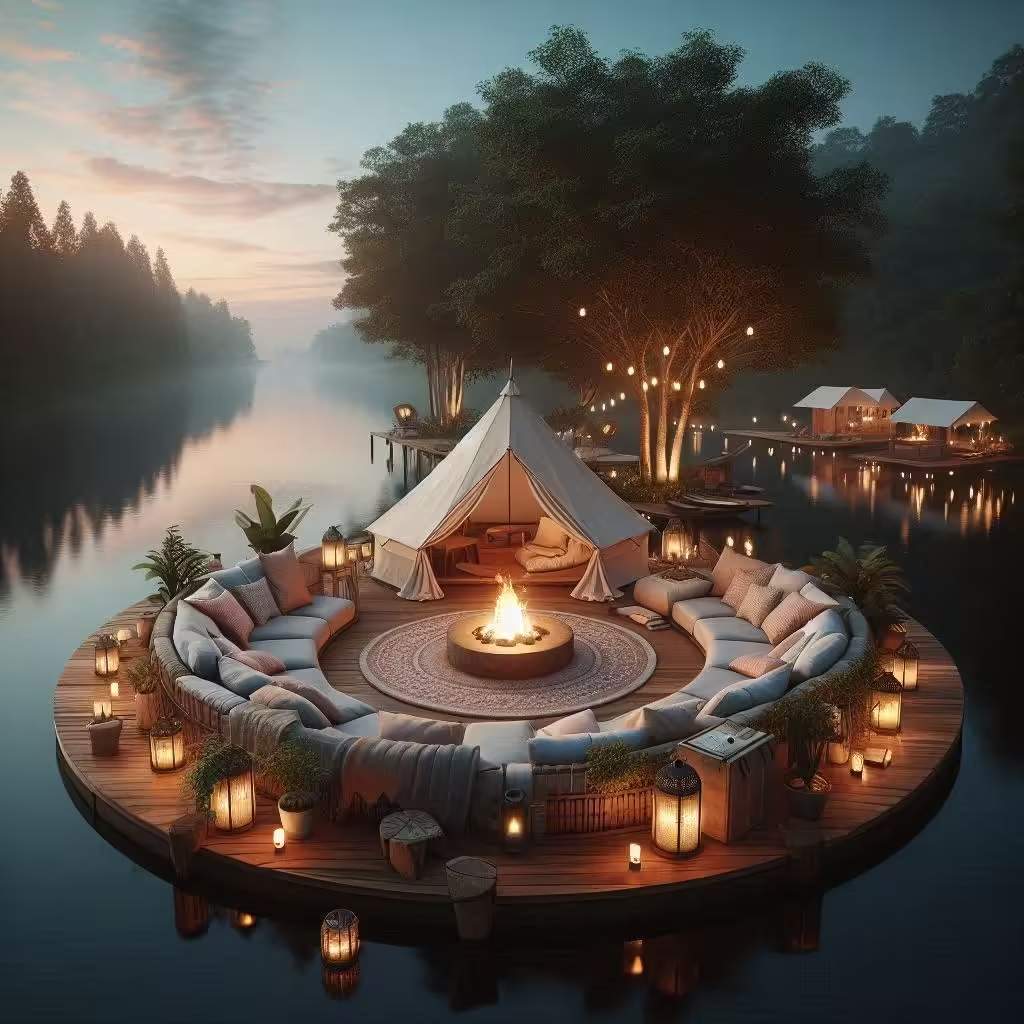
This method of exploration allows for a closer encounter with local wildlife, as paddling quietly can invite curious animals to approach Floating Campsites. You may spot otters playing in the water, herons fishing along the shore, or turtles basking in the sun.
Additionally, kayaking and paddleboarding provide excellent physical workouts, improving strength, balance, and endurance. Forming a team with fellow campers can turn these activities into friendly competitions or cooperative explorations, enhancing the overall experience.
Stargazing and Nighttime Enjoyment
One of the most captivating aspects of floating camping is the opportunity to indulge in stargazing. Far removed from city lights, floating campsites provide unobstructed views of the night sky, allowing campers to connect with the cosmos.
Set aside time after dark to lie back and marvel at the stars. Bring along a telescope, binoculars, or star charts to identify constellations and celestial bodies. Whether you’re an astronomy enthusiast or simply enjoy the beauty of the night sky, stargazing can be a magical experience.
Nighttime can also provide ample opportunities for storytelling, laughter, and bonding with fellow Floating Campsites. Share tales of past adventures or discuss dreams and aspirations under the twinkling stars, creating lasting memories that will forever link you to the experience.
Cooking and Dining on Water
Dining while floating camping presents unique challenges and opportunities. In this section, we will explore effective methods for cooking and enjoying meals on the water.
Portable Cooking Equipment
Investing in portable cooking equipment is essential for preparing meals while Floating Campsites. Options such as compact camp stoves, portable grills, or even multi-functional cooking devices can simplify meal preparation.
Choose cooking equipment that operates securely on your floating campsite, considering factors like wind and stability. Make sure to bring cookware and utensils that are lightweight, durable, and easy to clean. Opt for non-stick options whenever possible to reduce cleanup time.
Additionally, remember to include fuel sources, such as propane or charcoal, based on your selected cooking method. Each piece of equipment should be carefully packed to avoid spills or accidents during transport.
Meal Planning for Floating Campsites
Meal planning is a vital component of a successful floating camping experience. Prioritize simplicity and minimize perishable items to avoid spoilage. Focus on non-perishable food items such as canned goods, pasta, rice, and dehydrated meals.
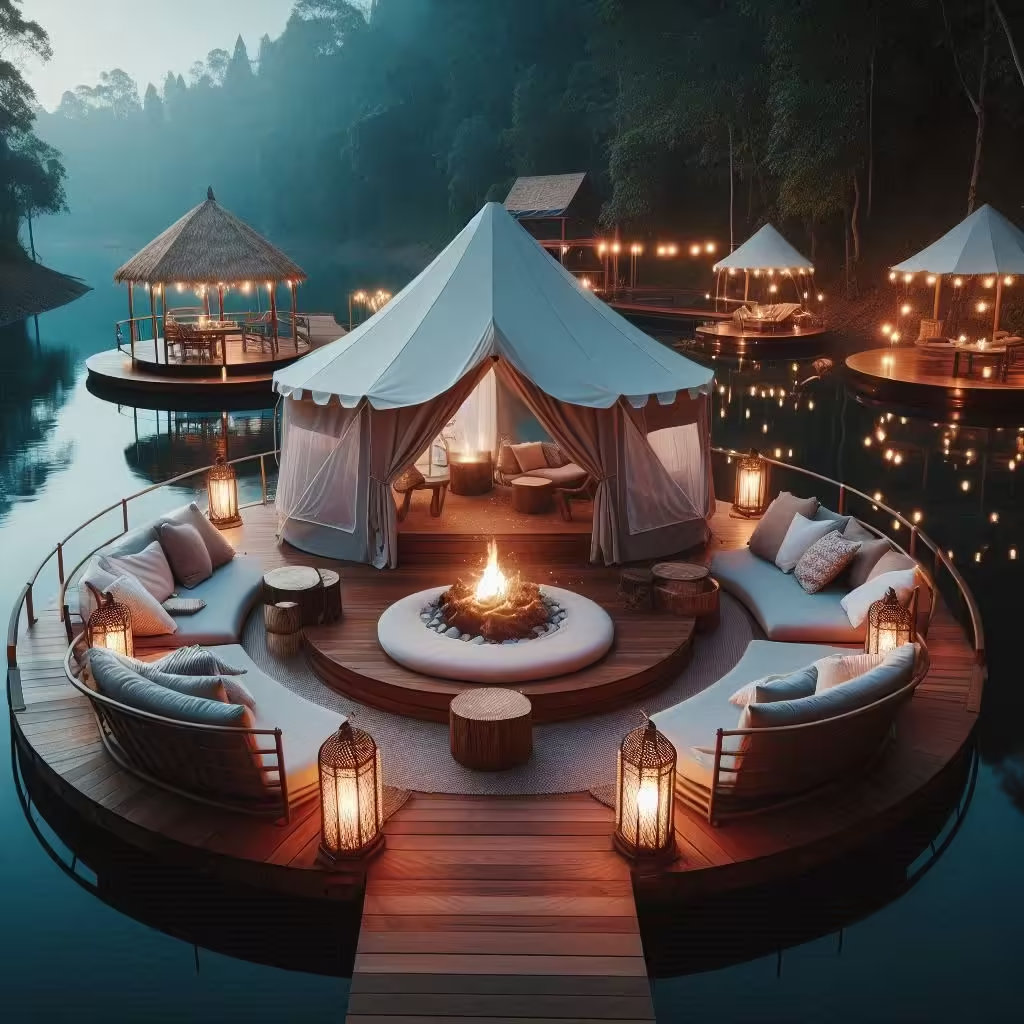
Develop a meal schedule that incorporates breakfast, lunch, dinner, and snacks, taking into account shared cooking responsibilities among fellow campers. Prepare as much as possible ahead of time, such as chopping vegetables or marinating proteins, to streamline mealtime on the water.
Coordinating meals also encourages teamwork and collaboration Floating Campsites, fostering camaraderie among your group as everyone contributes to the cooking experience.
Safety Tips for Cooking on Water
Cooking on water requires heightened awareness of safety concerns. First and foremost, ensure that all cooking equipment is stable and secure to prevent accidents. Establish a designated cooking space away from the edge of your floating campsite to minimize the risk of falls or spills.
Always practice fire safety, particularly if using open flames for cooking Floating Campsites. Keep a fire extinguisher or bucket of water nearby in case of emergencies, and follow local regulations regarding campfire use.
Additionally, ensure that all food items are stored securely to avoid attracting wildlife. Dispose of food scraps and waste properly to maintain a clean campsite. By prioritizing safety while cooking, you can focus more on enjoying meals and less on worrying about hazards.
Safety Precautions for Floating Campsites
Safety should always be a priority when exploring floating campsites. In this section, we’ll discuss critical safety precautions to keep you and your fellow campers protected throughout your adventure.
Understanding Weather Patterns and Conditions
Being aware of weather patterns is vital in ensuring a safe floating camping trip. Before heading out, research the expected conditions for your chosen location, paying attention to forecasts for wind, precipitation, and temperature fluctuations.
Keep an eye on changing weather conditions throughout your stay. Windy days can pose risks to small boats or inflatable structures, while sudden storms can create dangerous situations on the water Floating Campsites. Have contingency plans in place, such as alternate shelters or evacuation routes, in case of severe weather.
It’s wise to familiarize yourself with local weather patterns, particularly if you’re camping along rivers or coastal areas that may experience tidal changes or sudden surges. Understanding these elements allows you to adapt your plans accordingly and enjoy your floating adventure safely.
Wildlife Awareness and Prevention
Encountering wildlife can be a highlight of floating camping, but it’s essential to prioritize safety. Familiarize yourself with the types of wildlife in the area and learn how to manage encounters responsibly.
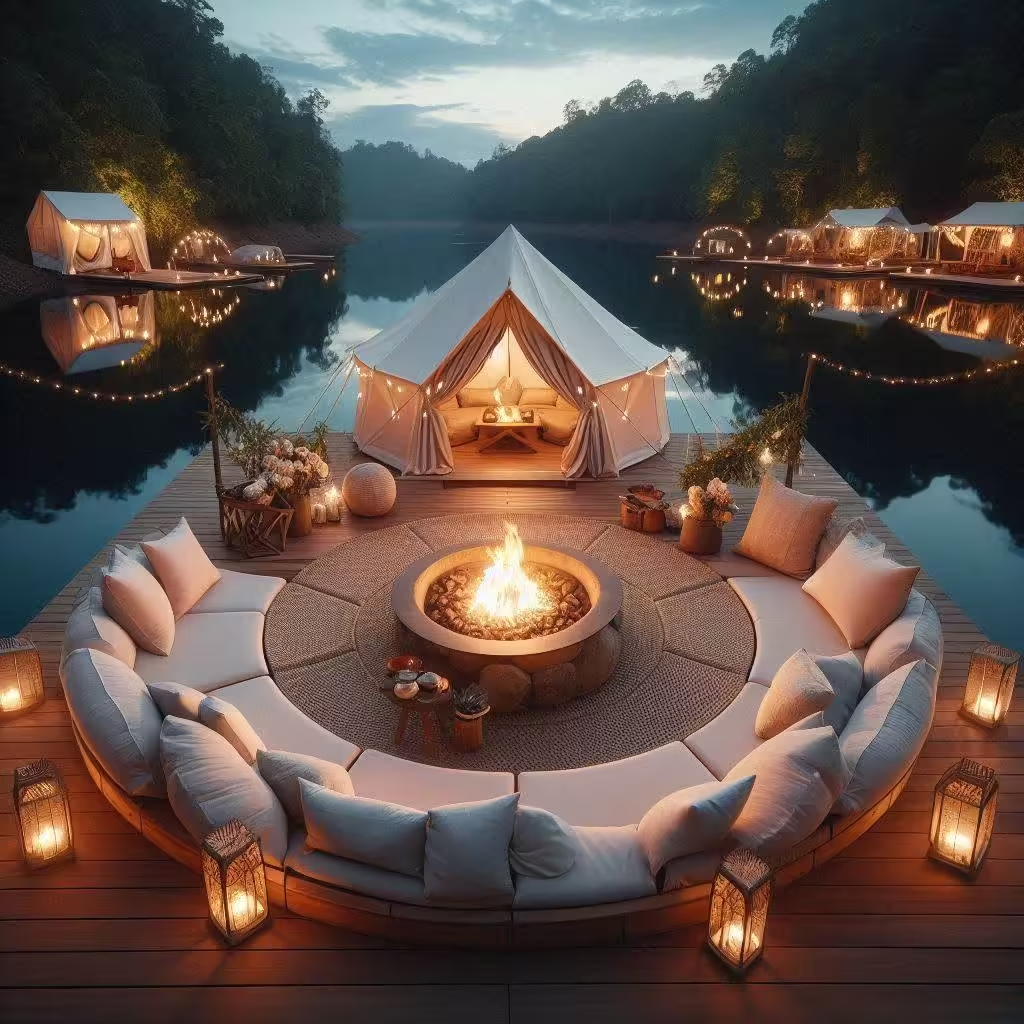
Store food in bear-resistant containers or elevated platforms to minimize attractants Floating Campsites. Avoid leaving food scraps behind, which can draw unwanted visitors. Respect wildlife habitats by keeping a safe distance and never attempting to feed or touch wild animals.
Educating yourself on local species and their behavior can help mitigate risks and create a more enjoyable experience. Awareness of wildlife dynamics encourages respect for nature and protects both campers and animals alike.
Emergency Procedures and Communication
Having an emergency plan is crucial for any outdoor adventure. Establish clear communication protocols among your group before heading out. Carry waterproof radios or satellite phones to stay connected, especially in remote areas.
Familiarize yourself with emergency response procedures specific to your location Floating Campsites. Know the nearest access points for rescue services and how to signal for help in case of emergencies.
In addition, establish a buddy system to ensure that everyone is accounted for and that there are always two people ready to respond in case of unexpected situations. Preparation breeds confidence, empowering campers to navigate challenges effectively.
Sustainable Floating Camping Practices
Engaging in sustainable floating camping practices is essential for preserving the natural beauty of aquatic environments. This section will discuss ways to minimize your impact and support local conservation efforts.
Minimizing Impact on Aquatic Environments
Sustainable camping practices begin with reducing your impact on aquatic environments. Familiarize yourself with Leave No Trace principles, which emphasize minimizing waste Floating Campsites, staying on established paths, and respecting wildlife.
Avoid disturbing natural habitats while navigating or camping on the water. Follow local guidelines for anchoring and camping, ensuring that your activities do not harm sensitive areas or ecosystems.
Practice responsible fishing by adhering to catch-and-release guidelines and respecting local fishing regulations. Floating Campsites By promoting sustainability in your actions, you help preserve the integrity of the aquatic ecosystem for future generations.
Promoting Eco-Friendly Camping Habits
Adopting eco-friendly camping habits can further contribute to the preservation of our waterways. Whenever possible, use biodegradable soaps and cleaning products to minimize chemical runoff into the water.
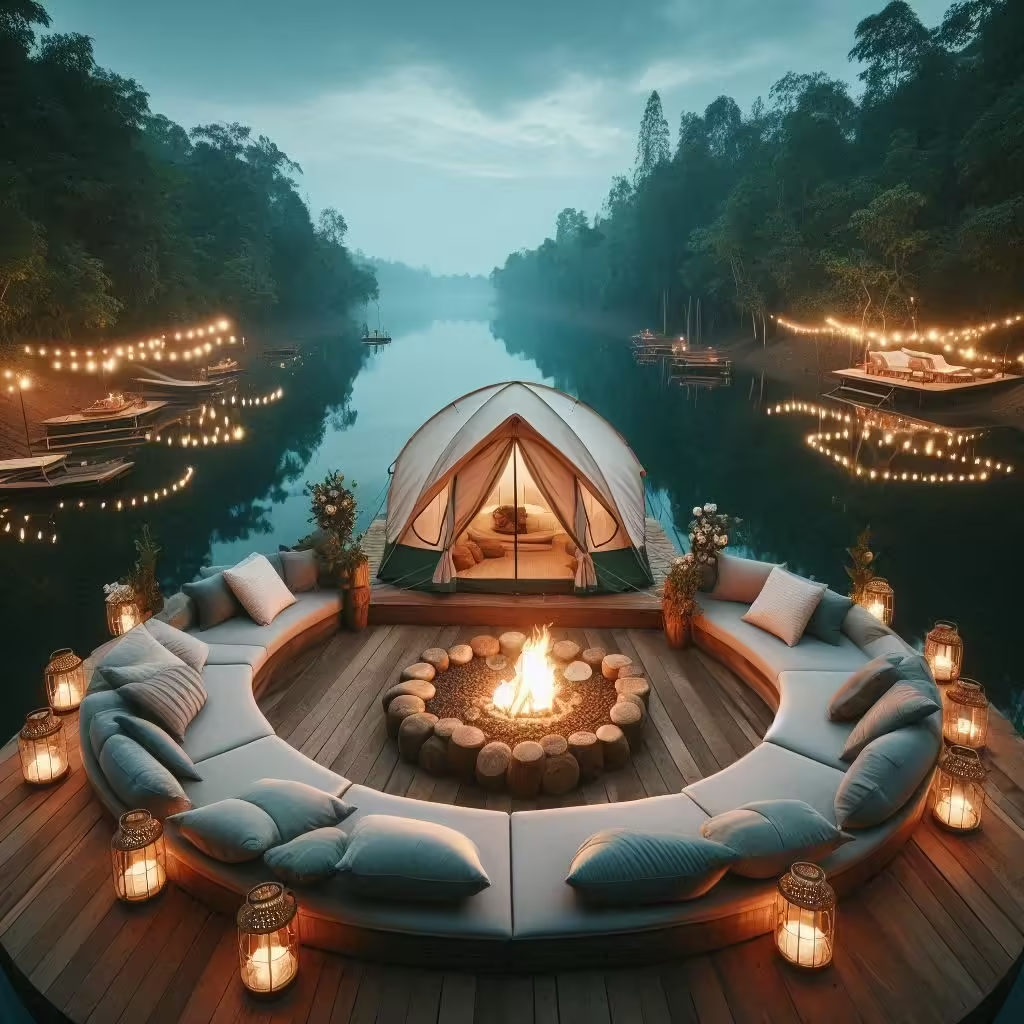
Opt for reusable or recyclable supplies to limit single-use plastic waste Floating Campsites. Invest in durable gear that can withstand repeated use rather than disposable products that can harm the environment.
Educate others about the importance of sustainability during your floating camping adventure. Sharing knowledge fosters a culture of responsibility and inspires fellow campers to adopt eco-friendly practices.
Supporting Local Conservation Efforts
Many regions offer opportunities for visitors to support local conservation initiatives Floating Campsites. Engaging in volunteer programs, participating in clean-up events, or donating to local organizations dedicated to preserving aquatic habitats can have a profound impact on the ecosystems you enjoy.
Research conservation efforts in your target camping area and look for ways to get involved, whether through hands-on volunteering or financial contributions. Supporting local conservation endeavors nurtures your connection to nature and strengthens communities committed to environmental stewardship.
Popular Floating Campsite Destinations
Floating campsites can be found in a multitude of breathtaking locations worldwide. In this section, we’ll highlight some of the most popular destinations renowned for their stunning aquatic scenery and opportunities for floating camping.
The Best Lakes for Floating Camping
Several picturesque lakes serve as ideal backdrops for floating camping adventures. One such location is Lake Tahoe, straddling California and Nevada, famous for its crystal-clear waters and surrounding mountainous landscapes. Campers can rent houseboats or set up floating tents on its tranquil shores.
Similarly, Flathead Lake in Montana offers expansive vistas, abundant wildlife, and diverse recreational activities. Its vast expanses lend themselves to Floating Campsites excursions, creating countless opportunities for exploration and relaxation.
These lakes, among many others, offer unique floating camping experiences, enticing visitors to bask in their beauty while enjoying water-based activities.
Rivers Known for Their Scenic Floating Spots
Rivers represent another avenue for floating camping escapades. The Colorado River, with its iconic canyons and striking red rock formations, attracts adventurers eager to navigate its rapids. Campers can set up floating tents or platforms at various entry points along the river, immersing themselves in the breathtaking surroundings.
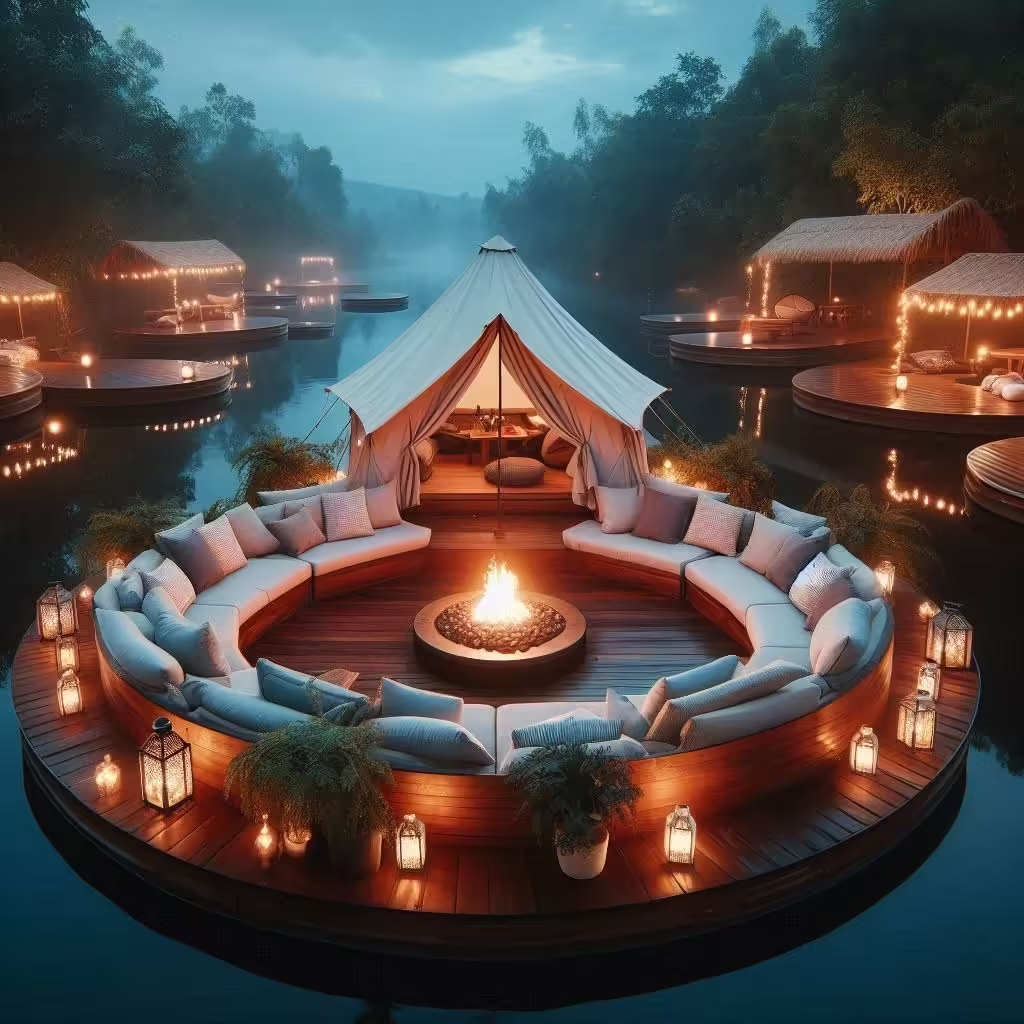
The Shenandoah River in Virginia also offers a scenic escape, featuring gentle currents and exceptional wildlife viewing opportunities Floating Campsites. Paddlers can float along its peaceful waters, discovering hidden gems while camping along the riverbanks.
Exploring these rivers allows campers to forge a close connection with flowing water, merging adventure with tranquility.
Coastal Areas Ideal for Water-Based Camping
Coastal areas provide yet another dimension to floating camping. The Florida Keys stand out as a paradise for floating campers, boasting warm weather and vibrant marine life Floating Campsites. Houseboats or floating tents allow campers to enjoy immediate access to snorkeling, fishing, or simply soaking up the sun.
In addition, the Pacific Northwest’s San Juan Islands offer stunning landscapes and rich ecosystems for floating camping. Campers can explore the islands’ lush greenery while enjoying the serene waters surrounding them.
With miles of coastline and endless opportunities for adventure Floating Campsites, these coastal locations promise unforgettable experiences for floating campers seeking memorable journeys.
Conclusion
Floating campsites capture the essence of adventure while allowing individuals to connect deeply with nature. From the unique experiences they offer to the opportunities for water-based activities, floating campsites present a refreshing alternative to traditional camping. By choosing the right location, planning thoughtfully, and adopting sustainable practices, you can create unforgettable memories while floating on water.
Whether you explore serene lakes, navigate winding rivers, or bask in coastal beauty, floating camping provides a chance to revel in the wonders of nature. So pack your gear, Floating Campsites find your perfect floating campsite, and embark on an extraordinary adventure that celebrates the beauty of the great outdoors!


